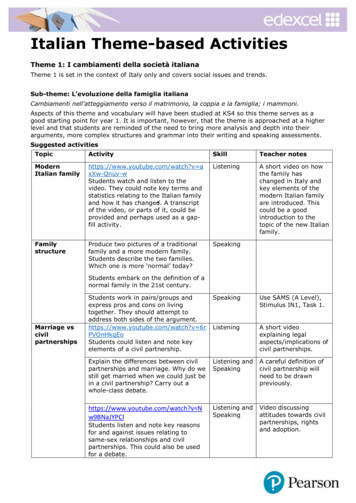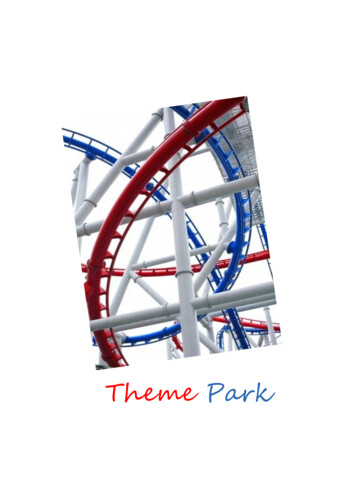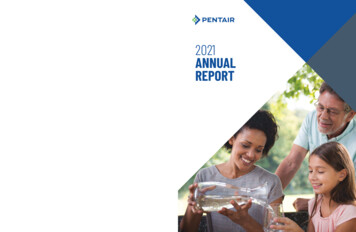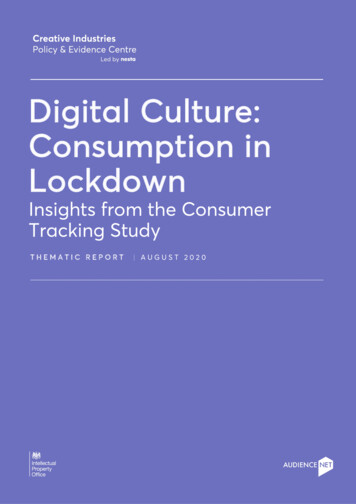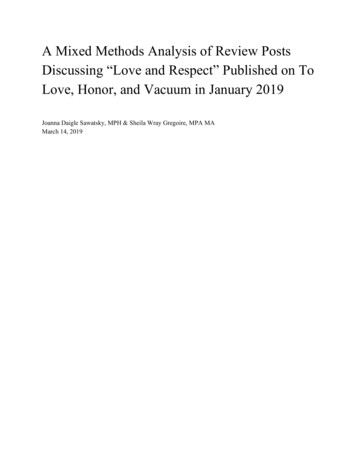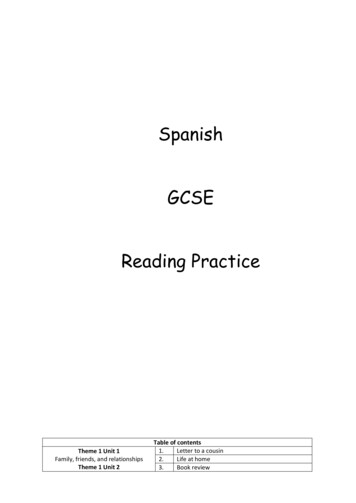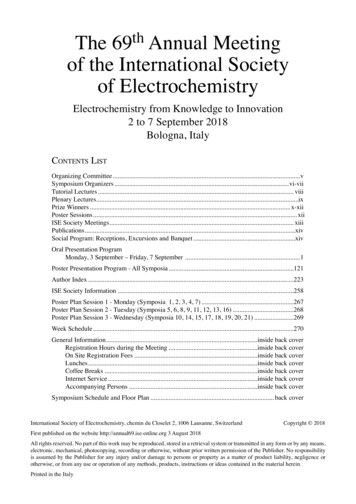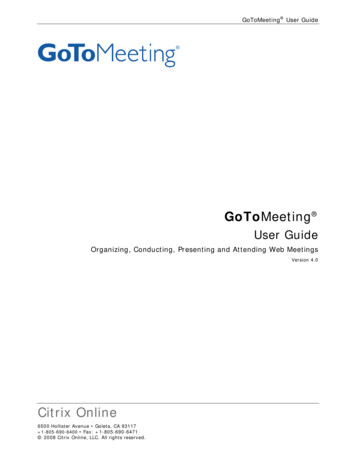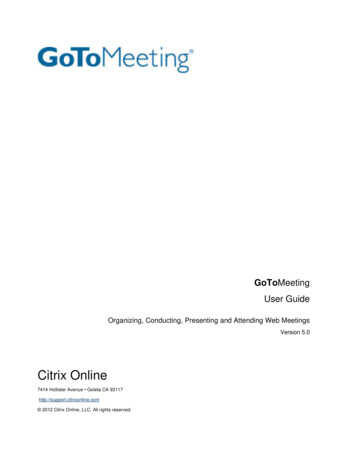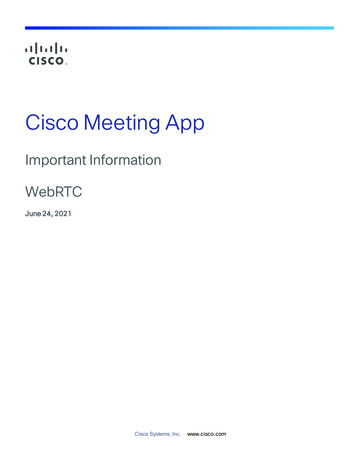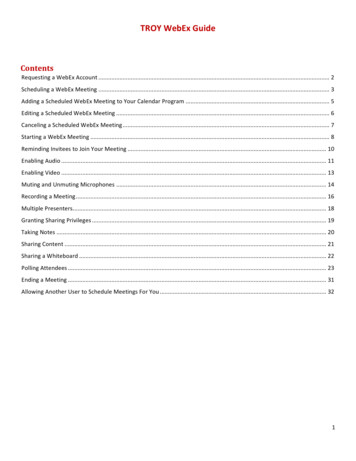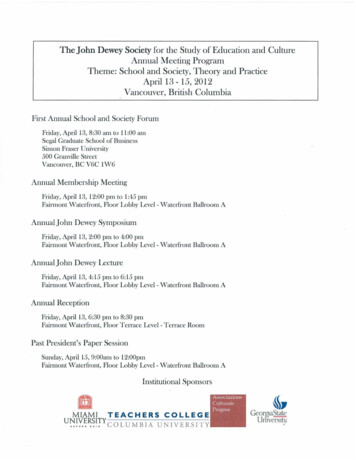
Transcription
The John Dewey Society for the Study of Education and CultureAnnual Meeting ProgramTheme: School and Society, Theory and PracticeApril 13 - 15, 2012Vancouver, British ColumbiaFirst Annual School and Society FommFriday, April 13, 8:30 am to II :00 amSegal Graduate School of BusinessSimon Fraser University500 Granville SlreetVancouver, BC V6C IW6Annual Membership MeetingFriday, April 13, 12:00 pm to 1:45 pmFairmont Waterli-onl, Floor Lobby Level- Waterli-ont Ballroom AAnnualJohn Dewey SymposiumFriday, April 13,2:00 pm to 4:00 pmFairmont Waterfront, Floor Lobby Level - Waterfront Ballroom AAnnualJohn Dewey LectureFriday, April 13, 4:1 5 pm to 6:15 pmFailll10nt Waterli-ont, Floor Lobby Level- Waterli-ont Ballroom AAnnual ReceptionFriday, April 13,6:30 pm to 8:30 pmFairmont Waterfront, Floor Terrace Level - Terrace RoomPast President's Paper SessionSunday, April 15, 9:00am to 12:00pmFairmont Waterfi-ont, Floor Lobby Level - 'vVaterfront Ballroom AInstitutional SponsorsIIMIAMIAssonazloneCultutalePlagmaT EAC HERS COLLEG EU ! TYco LU M BI AUN I V ERSIT Y S7GeorgIaStateUmversity.
The John Dewey Society for the Study of Education and Culture&The British Columbia Federation of TeachersCordially invite you to join in theInaugural School & Society ForumIntent: A public space embracing dialogue, interaction, and deliberationconcerning school and society issues across multiple stakeholders-P- 16teachers, policymakers, administrators, scho lars, parents, community educators,& interest groups---drawing upon John Dewey's thinking and contemporaryreinterpretations extending Dewey's commitments to democratic schooling.When: Friday, April 13, 8:30am - I lamWhere: Segal Graduate School of Business, Simon Fraser Univers ity, 500 Granville StreetVancouver, British Columbia, Canada (within close proximity to AERA headquarters hotels)Teachers' Unions Build Trust in TeachersPanel: Representatives from the British Columbia Teachers' Federation (BCTF) will offer perspectives on thechallenges and opportunities for the union in producing community trust in teachers and exercising teacheragency on behalf of learners and learning. Topics and speakers include:Professional autonomy: Joanna Larson is a member of the BCTF Executive Committee from Prince Rupert,BC, and has been a member of the BCTF Professional Issues Advisory Committee.Advocacy for educators and education: Kip Wood is a member of the BCTF Executive Committee fromNanaimo, BC.Parent and community support: Marjorie Dumont is the Coordinator of the Aboriginal Education Program ofthe BCTF.Panel Discussion: Audience participation will follow, facilitated by Dr. Paul Shaker, Professor Emeritus andimmediate past Dean, Simon Fraser University, British ColumbiaBreakout Conversations: Breakout sessions faci litated by John Dewey Society Members around relatedautonomy, advocacy, and community topics such as:Breakout # I Facilitators:Gert BiestaDavid Hansen; Anne PhelanDouglas J. SimpsonLynda StoneProfessional Autonomy: Do wewant/need teacher agency? Whatdoes agency look like? How can itbe fostered? What are the roles andresponsibilities of practicaldeliberation and professionaljudgment in classrooms and schoolstoday?Breakout #2 Facilitators:Jim GarrisonLinda O'Neill; Wendy PooleMaura Striano; Daniel VokeyStefano OliverioAdvocacy for Educators and theTasks of Educating: How do youcombat the bureaucratization andstandardization of educationalpractice? How might rules andpol icies guide, enable, andfe-moralize education? What isentai led in making practitionerknowledge central?Breakout #3 Facilitators:Deron BoylesHartej GillKyle GreenwaltBarbara Thayer-BaconParent and Community Support:In what ways can parents and thecommunity become partners andadvocates for education? Whatabout teachers' colleges and theirroles within communities? Whatdoes preparedness for teachingentail and how can supports becultivated and sustained?
Further Conversation: Editors of the newly created online forum for continuing and generating School & Societyconversations, publications, and resources will be available to share the online site and seek feedback on itspossibilities.Friday, April 13, 2012Coffee & Treats-8:30 amPanel Discussion-8:45 am to 9:45 amBreakout Conversations: 10:00 am-II :008""",P ,.Centre'}.I [J'- ShineySegal Graduate School of Business, Simon Fraser University, 500 Granville Street(Comer of Granvi lle & Pender)Institutional Spo nsorsIITEACHERS COLLEGEU !:-: :Y COLUMBIA UNIVERSITYMIAMI \,GeorgJaStateUmversltv.JI
The John Dewey Society fo r the Study of Education and CulturepresentsThe John Dewey Society Annual Membership MeetingI . Call to order, introduction of' members present, and approval of minutes from 20 II (Deron Boyles,President)2. Announcement of' 20 12 election results. ReCOh'Tlize outgoing Board Members. (Deron Boyles,President)3. Recognition of' Institutio nal Sponsors (Deron Boyles, President)4. O fficers' ReportsReport of the T reasurer (Kyle Greenwalt)Report of Membership and Development Oflicer (Kurt Stemhagen)Reportli'om Chair of the Commission o n Social Issues (Barb,ml Stengel)Report on Society Publicationsa. Education and Culture (David Granger, Editor)b. School and Society (Deb Seltzer-Kelly, Chair of the School and Society Committee)Report on The Daniel T anner Endowment (Dan T anner and Peter Hlebowitsch)4. Presidential message and discussion of items of' on-going concern (Deron Boyles)5. Other new businessDiscussion and membership vote on revised .IDS Constitution and By-Laws6. AcljournmentInstitutional SponsorsIiMIAMIIAssociaZlOneCultUtalePlagma S,TEACHERS COLLEGEGeorgJaStateUN I VERSITY-U y' I:YCO LU M B l AUmverSJty.
The John Dewey Society for the Study of Education and CultureTheJohn Dewey SymposiumThe symposium will explore the ways in which J ohn Dewey's thought, along with that of others working inLlle Deweyan tradition, may be extended to public classrooms and communities. O ur presenters, allworking at the intersection of language, literacy, and community, will weave togeLller theoretical andpractical aspects of this work, sharing Llleir results through audiovisual clips of classroom work.77,c H eart 01 u Ulguage, Tom VOg!, University of AugsburgIn Expcncncc and N;lture, Dewey (1 929/ 1958) wTote, "The heart of I,mguage . is the establishment ofcooperation in an activity in which there are partners, ,md in which the activity of each is modified andregulated by partnership" (p. 179). AJi.cr a discussio n of LllC argumentative context in which Lllis textoccurs, Llus paper presents a Deweyan approach to language learning Llut features optimal possibilities forlearners as active participants in vibr mt, intercultural, technologically enhanced learning communities.Examples are taken fi'om Llle "University-Community Links" projects in San Diego, Barcelona, andAugsburg, where social creativity nourishes on a daily basis.Relevance: The AcstJ,ctic and Pobiical Implications of Sc/lSual Cuniculum for ClasslVom Interacti ons,Walter Gershon, Kent State UniversityGrounded in Llle inexorable connections between aesthetics and politics in the first chapter of Dewey's Allas Exp en cnce and Dubois' Cniique ora Negro Alt, Lllis paper documents the importance of sensualcurriculum for understanding daily classroom interactions. T his paper first ouLlines Llle theoreticalunderpimungs o f that connection, Lllen draws (i'om a longitudinal collaborative ethnographic study toillustrate Llle insep,mlble connections between making sense ,md the sensorium. T he data demonstrateshow Llle intersection of the sensual and meaning-making served as incidental tools for print literacy fo remerging first grade readers and writers. /JlPowel1i,g M;u1j,iJaJizcd Youth: Cuniculum, Digli;J Mcdia, and Charactcr Devclopment, Nicholas NgA-Fook, University of Ottawa & Linda Radford, Bishop's UniversityDewey proposed Llut the development of character precedes the acquisition of knowledge, but that publiceducation too ofi.cn subordinated Llle experiences of Llle students to Llle curriculum. Today, researchsuggests Lllat a digital divide exists between the contexts of students' lived realities and teachers'pedagogical strategies for integrating digitalliteracies across the school curriculum. This multimediapresentation ex,unines the pedagogical and curricular strategies from a 2008-20 I 0 study that aIlo rdedmarginalized students an opportunity to learn the necessary knowledge and skills to produce andappropriate emergent fo rms of economic, social and cultural capital for Llle 21st century.Respondent: Willi,un E. Doll, J 1'. , Louisiana State University (Emeritus); University of British ColumbiaO rganizer and Chair: Deborall Seltzer-Kelly, SouLllern Illino is UniversityInstitutional SponsorsIIMIAMIAsSO(lazloneCulturalePragmaTEACHERS COLLEGEU y' ITY CO L U M B I AUN I V ERS ITY \7GeorglaSlateUniverstty.
The John Dewey Society for the Study of Education and CulturepresentsThe 54"' AnnualJohn Dewey LectureApril 13, 2012Vancouver, British ColumbiaJim Garrison, Virginia TechMaking Meaning Together beyond Theory and PracticeMany know Dcwey denied the UICOI")' vcrsus practice dualism, but f'ew recognize how it dependso n his claim UIat all meaning construction is really a social co-constructio n. Primo rdially, to have a mind isto having mcaning and to have meaning depends upon "lie establishment of cooperatio n in an activity inwhich thcrc arc partncrs and in which Ule activity of cach is m odilied and regulated by lie partnership"(LWI : 14 1). Similarly, to have a self is to takc Ule attitu de of Ule oUler in m eaninglul trans-actio ns. Wemakc mcanings, our minds, and our selves togcthcr. Jim Garrison's lecture willlirst seck to reUlink therelation bctwccn educationalUlcory and practice ,md Ulcn use the results, alo ng wiul help fi·om Uleaudicnce, to bcgin to rcliink Ule relatio n between university-based educational theorists, researchmethodologists and school practitioners. If succcssful , Ule results will exemplify Dewey's ideal in which"philosophy as a critical organ becomes in eflcct a mcssenger, a liaison oflicer, making rcciprocallyintelli!, ible voices speaking provincial to ngucs, and Ulereby enlarging as well as rectifying UIC meanings withwhich Ulcy ,u·c charged"(LW I: 306) .A bsIJ lCI.lim G,UTison is a professor of philosophy of educatio n at Virginia Tech in Blacksburg, Viq, inia where healso holds appointment in Ule departmcnt of philosophy, Ule alliance fa r social, political, eutical, andculturalUlOught, and the science, technology, and society program. His work conccntrates o nphilosophical pragmatism. Awards includc Ule Scholarly Achicvement Award fi·o m UIC Institute ofO riental Philosophy, lieJohn Dewey Society O utstanding Achievement Award, Medal of Highest Honorfrom Soka Univcrsity, Tokyo, ,md Ule J ames and Helen Merritt Award fa r Distinguishcd Service toPhilosophy of Education for his schol;u·sltip in thc philosophy of education. H e is a past-president of UleNorUI Amcrican Philosophy of Education Society ;md lie./ohn Dewey Society. Jim is president-elect ofthe Socict.y of ProlCssors of Education. H c is thc author or editor of eleven books, including mostrecenUy: A.G. Rud and .lim Garrison (2012) TeaciJlilg wiliJ Reverence: Reviving an A11dcnt llfitlle lorTodaY:5 Schools; and,Jim Garrison, Stef,m Neubcrt, and Kersten Reich {ForulCo ming} J ohn De wey'sPhIlosophy o/ Educalion -A11 [nuvducbon ,Uld ReconlexlllaJizabonlor Ollr 7}ines. .lim has recenUycomplctcd a scrics of twenty popular dialogues with Daisaku Ikeda, presidcnt of Soka GakkaiIntcrnational and Larry Hickman, head of Ule Ccnter fa r Dewey Studics uut appc;u·cd monthly in lieJapanese magazine T od1:Institutio nal SponsorsIIM[AMIAsSOClaztoneCultmaiePtagmaTEAC HERS COLLEG EU !:-: !y C OL U M B I AIUN I V E R S I T Y, \,GeorgmSmteUnIversIty.
The John Dewey Society for the Study of Education and CulturepresentsPast President's Paper SessionApril 15,2012Paper Presenters:Jessica A. Heybach (Aurora University) & Eric C. Shetlield (Missouri State University),Dystopia and Education: RadicalizlilgDewey's Aesdletics lil an Age olUtopia GoneWIDngRuthanne Kurth-Schai (Macalester College), Revitaii;ang Public .tilgagement lil Public.taucation Refonn: TowaJd a New Social MovementDeborah Seltzer-Kelly (Southern Illinois University), Immersion In Water While LeaJ7JJngto SWInI: A Deweyan Perspective on dle Role ol ChiJlcal Practice IiI Teacher EducationMaura Striano (University of Naples Federico II), PhIlosophy aJId Education: a DeweYaJlPerspectiveChair and Respondent: Lynda Stone (University of North Carolina), Past President of theJohn Dewey SocietyInstitutional SponsorsaMIAMI S,TEACHERS COLLEGEU ! I!Y C OL U M B 1AUN [ V E R SI TGeotgIaStateUmverslty.
A CALL FOR DONATIONSlJoec8cnoo/. alJO. c8 0 c ,·e oho . .The John Dewey Society for the Study ofEducation and Culture seeks new or gently usedbooks by John Dewey to benefit the "Mother ofCivilizations" library project for flood victims inthe Indus Valley, Sindh, Pakistan.Donations and inquiries may be sent to:Mali Lucas-Green157 North AvenueJonesboro, Georgia 30236678 .772 .2496Institutional SponsorsaAssociazioneCultutaleMIAMI TEACHERS COLLEGEUNIVERSITY , . . . . . . .C O LUM B IA UN I VE R SIryPlagmo S,GeorgIaStateUmverslty.
The John Dewey Society for the Study of Education and CultureAnnual Membership Form7HEJOHN DEWEY SOCIETY FOR THE STUDY OF EDUCA 770N ANDCULTURE encourages through its publications and progTams careful and responsibleexamination of our most basic educational and cultural commitments.JOHN DEWEY SOCIETY membership dues are based upon one's income, and are asfollows: 75 60 45 30 75,000 or above 60,000 - 75,000 45,000 - 60,000 45,000 or lessJohn Dewey Society members receive an annual subscriptions to the Society's journals,.taucation and Culture (hardcopy, 2 issues per year) and our new practice-focused journal,Schoo! and Society (electronic, 2 issues per year). When available, they will also receive theannual.John Dewey Lecture in book format.Another benefit for .IDS MEMBERS is a special rate of 25 lor a subscription toEDUCATIONAL 7HEORY. A subscription to Educational TheOlyincludes online accessto other philosophy of education journals through Blackwell Publishing's Synergy Service. Ifyou choose to subscribe to Educational 77JeOly, please enclose your added payment for asubscription along with your membership renewal.Inquiries aboutJDS membership should be directed to greenwlt@msu.eduFor additional information see the.JDS Website: www.johndeweysocietv.orgInstitutional RS COLLEGEU r:rYC 0L U M B I A UN I V E R S IT Y \,GeorgpStateUmverslty.
The John Dewey Society for the Study of Education and CultureAnnual Membership FormJohn Dewey Society Membership ApplicationNillne:Addrcss I :Address 2:City:Zip Code:State:Email:Institutional Alliliation/ Position:Telcphollc: (indicatc illnount bascd on chart abovc).MEMBERSHIPEDUCATIONAL THEORY OPTION ( 25, write in amount if interested).G IFT DONATION TO lDS (indicate amount).L TOTAL AMOUNT ENCLOSEDMake checks payable to the.John Dewcy Society (in US dollill-s) illld mail to:Kyle GreenwaltDepill-lment of Teacher EducationMichigan Stale University328 Erickson HallEast uU1sing, MI 48824f O R MORE INfORMATIO N REGARD! G INSTITUTIO NAL SPONSORSHIPS, PLEAS ECONTACt' KYLE G REENWALT AT greenwh@msu.edu.Institutional SponsorsmMIAMIITEACHERS COLLEGEU !;'-: TY CO L U M B I AUN [ V E R S IT YIAssonazloneCulturalePlagrnd \,GeorgIaStateUmverslty.
The John Dewey Society for the Study of Education and Culture & The British Columbia Federation of Teachers Cordially invite you to join in the Inaugural School & Society Forum Intent: A public space embracing dialogue, interaction, and deliberation concerning school and
